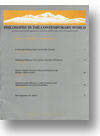|
1.
|
Philosophy in the Contemporary World:
Volume >
3 >
Issue: 2
Michael G. Barnhart
Is Naturalized Epistemology Experientially Vacuous?
abstract |
view |
rights & permissions
| cited by
By naturalized epistemology, I mean those views expressed by Nozick and Margolis among others who favor an evolutionary account of human rationality as an adaptive mechanism which is unlikely to provide the means for its own legitimation and therefore unlikely to produce a single set of rules or norms which are certifiably rational. Analyzing the likely relativism that stems from such a view, namely that there could be divergent standards of rationality under different historical or environmental conditions, I conclude that evolutionary epistemologies are unable to account for rationality as an experienced capacity on the part of human beings. After giving a few examples of what seem to me to be cases where we do experience a form of reason that appears antinomian, I challenge a naturalized view of mind to embrace and provide some sort of explanatory account of this kind of mental elasticity that it both seems to make room for and is certainly not unfamiliar to other philosophical perspectives such as that of Zen Buddhism.
|
|
|
2.
|
Philosophy in the Contemporary World:
Volume >
3 >
Issue: 2
Michael P. Nelson
Rethinking Wilderness:
The Need for a New Idea of Wilderness
abstract |
view |
rights & permissions
| cited by
The “received” concept of wilderness as a place apart from and untouched by humans is five-times flawed: it is not universalizable, it is ethnocentric, it is ecologically naive, it separates humans from nature, and its referent is nonexistent. The received view of wilderness leads to dilemmas and unpalatable consequences, including the loss of designated wilderness areas by political and legislative authorities. What is needed is a more flexible notion of wilderness. Suggestions are made for a revised concept of wilderness.
|
|
|
3.
|
Philosophy in the Contemporary World:
Volume >
3 >
Issue: 2
Stephanie S. Turner
Toward a Feminist Revision of Research Protocols on the Etiology of Homosexuality
abstract |
view |
rights & permissions
| cited by
Examining the language and paradigms of science as rhetorical, that is, arising from the sociocultural forces that shape ideology, reveals androcentric assumptions that tend to thwart democratic public policy as well as effective methodology. This paper applies some recent feminist critiques of the biological sciences to the current research on the possible hormonal and genetic factors contributing to homosexuality, clarifying how this research perpetuates hierarchical binaries and suggesting ways to reconceptualize human sexuality through revised research protocols.
|
|
|
4.
|
Philosophy in the Contemporary World:
Volume >
3 >
Issue: 2
Joseph Wagner
Incommensurable Differences:
Cultural Relativism and Anti-rationalism Concerning Self and Other
abstract |
view |
rights & permissions
| cited by
This paper is a defense of rationalism and a critique of what I call anti-rationalist themes in postmodernist, feminist and multiculturalist thought. I use the term rationalism in its broad sense to identify an extensive set of philosophic assumptions rooted in the Enlightenment. Rationalism in this sense encompasses the empiricist, materialist and Kantian positions out of which modern analytic philosophy develops In particular, this paper focuses on criticisms that treat rationality and attendant presumptions of objectivity as a Eurocentric form of ethnocentrism. These anti-rationalist concerns are often expressed in prescriptions for multiculturalism and complaints about Western logocentrism and insensitivity to the importance of difference, diversity, attunement, and other. The paperidentifies central themes that reflect this anti-modern and antirationalist temper and argues that each embodies a deep irresolvable philosophic confusion. In developing this critique, I try to show that the Enlightenment project, properly understood, provides the best and most comprehensive groundings for declaiming and remedying the faults of ethnocentrism and prejudice.
|
|





